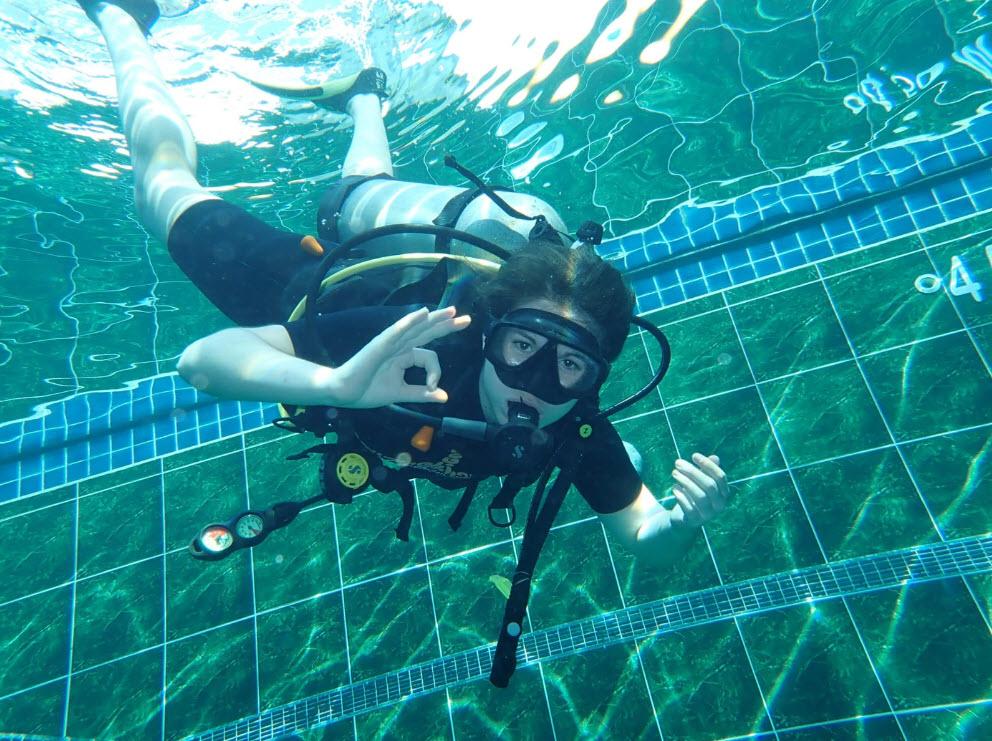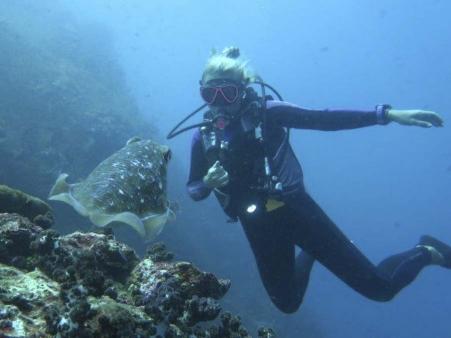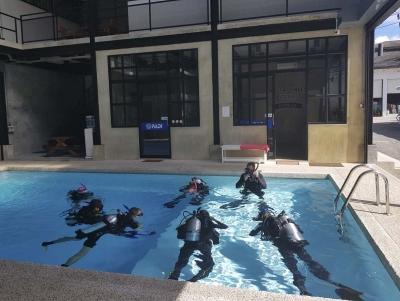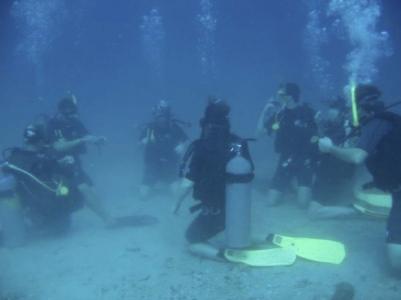You may have heard of or been advised to do a ‘refresher dive’, which is also called a scuba review. This is usually when a certified diver who plans to go diving in the sea but hasn’t dived in more than one year. Refresher dives are useful, important, inexpensive, and they can be fun. They can be done in a pool or at a local reef where the conditions are calm, and the water not too deep. The main reason for refresher dives is to check and practise the main skills necessary for scuba diving, so that when you go out to sea you can enjoy the dive safely, without panicking or inconveniencing others.

For who & why is the refresher needed?
Each dive centre has its own policies about who requires a refresher dive, but in every case it is mainly to benefit the diver before he or she goes out to sea. In most cases, anyone who hasn’t dived for one year needs a refresher, but if you are experienced (50+ logged dives) then it might not be necessary. And of course, someone with 100 dives who hasn’t dived in 18 months is probably in less need of a refresher than someone who has less than 10 dives with the most recent 11 months ago. Each case is different. Please note that most dive centres don’t encourage you to do the refresher so that the business can make more money. They encourage you to do it to benefit you, and benefit others in your dive group, but more about that later.
How much do Refresher Dives cost?
The price of refresher dives depends on several factors. These include whether it’s in a pool or at a local reef, the country you’re doing it in, and how many people you are. $30 is the average cost if you’re doing it alone in the pool, but this can be reduced to less than $20 if you’re one of a small group. Sometimes it’s possible to go out to a local reef and do a couple of dives, with a lunchtime surface interval. These mini day trips cost around $80. All prices include a full standard set of rental equipment.
Where can I do a Refresher Dive?
 Scuba Reviews (Refresher Dives) are most-commonly done in a swimming pool or specially-designed scuba diving pool, but if the dive centre has access to a local reef that guarantees calm conditions (no waves or current) then this is also possible.
Scuba Reviews (Refresher Dives) are most-commonly done in a swimming pool or specially-designed scuba diving pool, but if the dive centre has access to a local reef that guarantees calm conditions (no waves or current) then this is also possible.
Shallow pools are not suitable to perform the refresher dives, because you need to be able to submerge and practice buoyancy skills, and to be able to go deep enough to equalise your ears. The minimum depth should be at least 2.5 metres. Some dive centres have access to swimming pools that are up to 4.5 metres deep. These are much better than shallower pools by giving the opportunity to test for any ear problems because of the greater depth and increased pressure.
Local reefs are the best place to do a refresher dive, simply because there’s marine life to make the dive more interesting. The distraction of fish can make nervous divers forget about their worries. However, the sea conditions need to be right. There must be no waves at the surface and no current during the dive. Also the water mustn’t be too deep.
How long does a Refresher Dive take?
If it’s in a pool, then it could take as little as one hour, but not more than two hours. A local reef dive would take normally no more than an hour, because most dives in open water are limited to that time. But if you go on a two-dive local reef mini day trip, then of course you need to include travel times and the surface interval.
What is taught or practised on the Refresher Dive?
 During the refresher dive you will be shown and asked to repeat the basic skills that you learned during your Open Water Diver Course. These include, but are not limited to;
During the refresher dive you will be shown and asked to repeat the basic skills that you learned during your Open Water Diver Course. These include, but are not limited to;
- Setting up equipment
- Regulator recovery
- Mask clearing
- Buoyancy control
- Communicate how much remaining air you have
- Clear/Purge your regulator
- Hand signals
- Inflate/Deflate BCD
But before you get in the water, your dive professional will spend some time reviewing a bit of theory, such as the science of scuba diving and what happens to our bodies under increased pressure, plus communication signs and protocol in certain situations.
The benefit to others in your group
 One other reason that refresher dives are important is the benefit to the others in your group when you get out to sea to dive properly. Imagine if you are an experienced scuba diver who does not need a refresher because you dive regularly, but someone else in your group didn’t do a necessary refresher dive. Maybe that diver will inconvenience the group, including you. Ways that other divers can inconvenience you include having trouble descending to the reef (which is even more of a problem if there’s current), or using their air supply quicker than necessary due to overexcitement or misuse of their equipment. Your dive could be spoiled and/or shortened if someone else in your group didn’t do the necessary refresher dive. Therefore, if the dive centre advise or tell you that you need to do a refresher dive, please do it. It will benefit you and the rest of your diving group.
One other reason that refresher dives are important is the benefit to the others in your group when you get out to sea to dive properly. Imagine if you are an experienced scuba diver who does not need a refresher because you dive regularly, but someone else in your group didn’t do a necessary refresher dive. Maybe that diver will inconvenience the group, including you. Ways that other divers can inconvenience you include having trouble descending to the reef (which is even more of a problem if there’s current), or using their air supply quicker than necessary due to overexcitement or misuse of their equipment. Your dive could be spoiled and/or shortened if someone else in your group didn’t do the necessary refresher dive. Therefore, if the dive centre advise or tell you that you need to do a refresher dive, please do it. It will benefit you and the rest of your diving group.
“But I’m a good swimmer, confident in the water, and I’m fit. Do I really need the refresher?”
Yes. This is something that we hear many times from our guests who prefer not to do the necessary refresher dive. It makes no difference how fit, confident in water or good at swimming you are. Not being scared of deep water and being fit and able to swim are good credentials for scuba divers, but these make no difference to your need for a scuba review or refresher dive.
All in all, a Scuba Review/Refresher Dive is necessary for any divers who lack experience, recent dives, or confidence. There’s no shame or stigma in doing a scuba review, and it’s much better than letting others down out at sea because you misused your equipment, didn’t descend with the group or used your air more quickly than you should. Refresher Dives are not something made up to increase profits. They are purely to benefit you and the other divers in your group out at sea. Their focus is on maximizing safety and enjoyment, in that order.



Comments